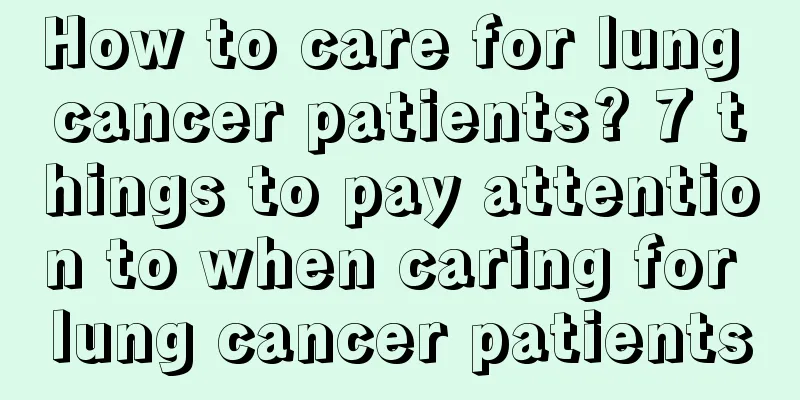How to care for lung cancer patients? 7 things to pay attention to when caring for lung cancer patients

|
I believe everyone is familiar with lung cancer! Nowadays, the incidence of lung cancer is constantly increasing, so more and more people are paying close attention to the disease. However, for lung cancer, it is not enough to just do a good job of treatment. We also need to take corresponding nursing measures. Create a good living environment for patients. The room should be clean, the air should be ventilated, and there should be a certain humidity. Avoid dry air in winter. Patients should be in a good mood, treat the disease correctly, not complain about the weather, actively cooperate with doctors for treatment, take medicine according to doctor's orders, and have regular checkups. Patients should be urged to quit smoking and drinking, and avoid eating irritating things. Pay attention to whether the patient coughs up phlegm, the difficulty of phlegm, the amount of phlegm, whether it is accompanied by hemoptysis, and the color and volume. Patients with cough and asthma should sit or lie down in the early morning, which is conducive to smooth breathing and sputum discharge. Pay attention to whether the patient has enlarged supraclavicular lymph nodes, swollen and congested head and face, thickened neck, and exposed neck veins. If the above symptoms occur, "superior vena cava syndrome" should be highly suspected. Pay attention to whether the patient has changes in consciousness and personality, severe headache, jet-like vomiting, hemiplegia, and diplopia. If the above symptoms occur, brain metastasis should be highly suspected. When caring for patients, you must be patient, caring, and loving, put yourself in their shoes, speak kindly and kindly, and have a gentle attitude. 1. Prevent and control infection. 2. Pay attention to changes in the patient's condition. For elderly people with large amounts of hemoptysis, first aid items should be prepared to prevent suffocation. 3. Once typical symptoms appear in lung cancer patients, a considerable number of them are already in the advanced stage of lung cancer. Therefore, regular X-ray examinations and screening of high-risk groups are of great significance for the early detection and early treatment of lung cancer. 4. Promote smoking cessation, avoid and reduce the inhalation of air and dust containing carcinogenic factors, and improve working and living conditions. 5. Carry out health education on the prevention and treatment of lung cancer to raise the awareness of lung cancer among the elderly so as to facilitate early detection and early treatment. 6. Understand the diet, sleep and psychological state of the elderly, and provide practical psychological care to keep the sick elderly in a good psychological and physical state, so as to improve the treatment effect. 7. For elderly people with advanced lung cancer, analgesics can be used moderately to improve their quality of life. Experts remind: Patients with lung cancer need to have more air circulation in their living areas to ensure the appropriate humidity. In winter, they should pay attention to not letting the air be too dry. In addition, patients themselves also need to maintain a good attitude, have a correct understanding of the disease, and actively cooperate with doctors' diagnosis and treatment. |
<<: What are the specific early symptoms of lung cancer? 10 early symptoms of lung cancer
Recommend
What is frequent urination
The main symptom of frequent urination is that yo...
Three proven Chinese medicine prescriptions for treating gastric cancer
Traditional Chinese medicine believes that the oc...
What are the chemotherapy drugs used in clinical treatment of lung cancer
Chemotherapy is one of the three main methods for...
What is the cause of late recurrence of breast cancer
Breast cancer is a malignant tumor that harms wom...
Introduction to the classification and treatment of spots
There are many types of spots, not just the commo...
Is prostate cancer vomit contagious?
Is prostate cancer vomit contagious? Everyone is ...
Is it harmful to eat Himalayan salt?
Salt is a substance necessary for the human body....
Sequelae after treatment of nasopharyngeal carcinoma
Nasopharyngeal carcinoma is a malignant tumor of ...
What should I do if I suspect I have stomach cancer at the age of 24?
If a 24-year-old suspects that he or she has stom...
What is the reason for the foul smell of urine
Many people know that by looking at the urine you...
Is steam sauna effective for acne removal
Many young people have a lot of acne on their fac...
Let's talk about the side effects of chemotherapy for ovarian cancer
Chemotherapy is one of the commonly used treatmen...
What to do if you have pimples on your face
Acne on the face is a problem that bothers many p...
Why is it that my finger still hurts after being stitched for a week?
If the external injury of a person's finger i...
What are the dangers of advanced breast cancer
What dangers will patients face after suffering f...









